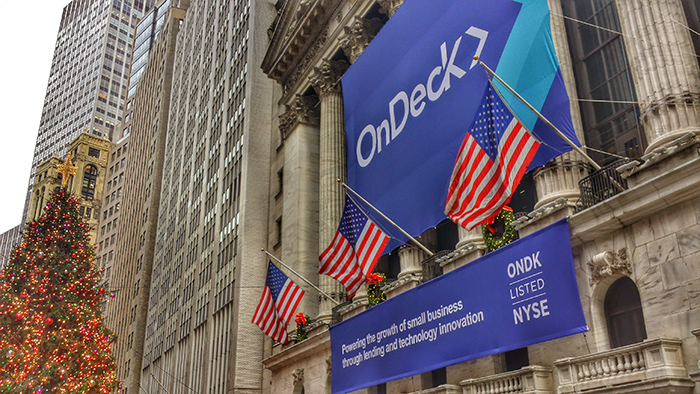Articles by Gerelyn Terzo
Goldman, Cohen Bet on Nav
May 19, 2017
Goldman Sachs. Steve Cohen. These are a couple of the high-profile investors that small business credit and finance startup Nav has attracted to line its coffers. Nav recently lifted the size of a Series B round by $13 million for lead investor Goldman Sachs Principal Strategic Investments as well as Cohen’s Point72 Ventures and others, bringing the tally for this round to $38 million.
Levi King, co-founder and CEO of Nav, told deBanked that Goldman Sachs was drawn to the startup’s robust vision, which is to decrease the death rate of small businesses in the United States. He said doing so would have a trickle up effect on Goldman and the capital markets.
“Goldman Sachs invested as a bank investment, not other people’s money. They believe with scale we will change how small business owners make financial decisions, and that will impact the capital markets. We will have a fundamental impact on the entire ecosystem, if we’re successful.”
Goldman clearly believes it’s a good bet, and Cohen’s Point72 Ventures agrees.
“We have the ability at scale to change what can happen in the capital markets based on our data, and that’s something [Point 72] wants to be a part of. They are a smart advisor for us from a data perspective – a quant hedge fund that’s best in class on data. We get free advice along the way. That’s part of the deal,” King said.
In fact, it was another major player in the credit scene that gave the nod to other investors to follow.
“It all started with Experian. That investment was a bigger landmark than any of the other ones. Experian is the biggest credit agency in the world and they had never done a venture investment until us. This sent a signal to other investors,” said King, referring to a partnership that was inked less than a year ago.
The Vision
King points out that bringing the startup’s vision to reality is a gamble. For instance, Nav’s current customer count is 215,000 and they aspire to have 28 million. “That’s the path that we’re on,” he said. The path includes the startup’s most recent expansion into business checking account data.
“We launched a loan reality check app on Android. We’re only testing it. Nothing like it exists. You put in a username, password and banking information, and we model that data and determine how likely it is that you will qualify for a loan based on that data set,” said King.
For instance, if a business has a history of bouncing checks, that’s a negative for scoring. Depository trends also count toward scoring.
“We’re sitting on personal credit, business credit and checking – three data sets. Now we have enough data for lenders to make full decisions on products like business credit cards,” said King, who makes a clear distinction between the various channels involved in the credit equation.
“To be clear, the small business owner is our customer. Lenders are our partners. Business owners win every time,” he said, pointing to the example of one lender partner.
While King wouldn’t disclose the lender he acknowledged that they are a top-10 financial institution that wanted to pay for a top result for its business credit cards among Nav’s product recommendations. This would have been a sponsored result, but it didn’t sit well with Nav. “It would have been a sweet check, but our product would lose integrity for the customer. We said no,” he said.
Also part of the vision is international expansion. “We have those ambitions. That’s why we’ve taken capital from foreign investors, to see how our model can apply in their markets. But that’s way out there,” he said, pointing to investments by CreditEase Fintech Investment Fund in this most recent round and Tencent in a previous round, both of which are based in China.
Meanwhile King said the fresh capital will be prioritized across three buckets. “We’re pretty disciplined at how we deploy capital. I will tell you what I have repeated thousands of times internally to our business. We spend money on acquiring new customers, improving our technology and UX and compensating our employees. We don’t waste money on in-office massages. At this stage a lot more of that capital goes toward customer acquisition,” he said.
Clocktower Technology Ventures also invested in the most recent Round B. Point72 Ventures and Goldman Sachs did not immediately return calls seeking comment.
The Tesla of Alternative Lending
May 16, 2017 Tesla has autopilot. Apple has Siri. And Upstart has its own high-tech software model that places the startup in a category of its own for online lending. All three of these companies may be very different but what they have in common is a reliance on artificial intelligence and machine learning for their proprietary technology.
Tesla has autopilot. Apple has Siri. And Upstart has its own high-tech software model that places the startup in a category of its own for online lending. All three of these companies may be very different but what they have in common is a reliance on artificial intelligence and machine learning for their proprietary technology.
“You hear so much about how Tesla cars will drive themselves, how Google or Amazon home assistants talk to you to as if you’re human. In lending we are the first company to apply these types of technologies to lending,” Dave Girouard, Upstart co-founder and CEO told deBanked.
So what is machine learning exactly, particularly as it relates to finance? One of the main components that goes into machine learning is not looking at the same data everybody else does. “We are known for looking beyond FICO and the credit report. We look at who the employer is, what industry you work in, where you went to college, what you studied, several hundred variables affect how we price credit,” he said.
Upstart, a direct-to-consumer lending platform, uses artificial intelligence and machine learning for everything from verifying a potential borrower’s identity, to making a credit decision, to pricing credit. Today 25 percent of the company’s loans are 100% automated.
“This is a radical departure from the industry,” said Girouard. “It’s a function of being able to build more automation to verify information about the borrower.”
Indeed the differences between machine learning and traditional credit models is kind of like comparing a self-driving vehicle to walking.
“The whole term machine learning implies that software gets smarter and better on its own with no human intervention. Every day thousands of repayments are made to Upstart along with delinquencies, and defaults. As this happens the software is adjusting its pricing on the next loan, learning in real time every day,” Girouard said, without even the slightest concern of tipping his hand.
“We have a several year head start and a data science team that are math and statistics PhDs. These are the types of people hired by Google or Tesla or Amazon. Traditional consumer credit doesn’t tend to have machine learning skills,” he added.
Nevertheless his vision for artificial intelligence and machine learning in the lending community is far greater than as it applies to Upstart alone. “We think virtually all flavors of lending will depend on AI/ML within 10 years. We’re at the very early stages, but it’s hard to imagine a successful lender anywhere who doesn’t use similar technology over time,” Girouard said.
Inside Upstart
Upstart is a hybrid lender that funds 20% of loans from their balance sheet. Two months ago they began licensing software as a service (SaaS). The software is managed by Upstart but it appears on the partner’s website. “A bank could use our technology to originate loans,” said Girouard, adding that the company is in conversations with two-to-three dozen banks about future partnerships.
The machine learning approach seems to lend itself to favoring certain demographics. In the case of Upstart, this happens to be millennials, evidenced by the lender’s average customer age of 28, almost all of whom have college degrees.
“Obviously we understood early that the millennial generation doesn’t have 20 years of credit history and they have a hard time getting loans. It struck us, tell me you wouldn’t give a loan to a 25 year old just because they have a thin credit file? It doesn’t make sense. What if they studied at Stanford and work at Google? There is more to be known about an individual than a FICO score,” said Girouard.
Perhaps the greatest evidence of whether or not Upstart’s approach is working is to catch a glimpse of the company’s balance sheet. Upstart expects to reach the $1 billion milestone for loan originations in calendar 2017. And perhaps even more telling is they anticipate being profitable by the summer. “An IPO for us would be a couple of years out,” Girouard said.
That timing could be perfect, particularly considering Wall Street’s apparent love/hate relationship with some players in the alternative lending space.
“People tend to paint the whole industry with one brush and it’s not a very pretty brush at the moment. But soon they will begin to appreciate there is a significant difference between these companies. Upstart really does have a very differentiated and unique product,” said Girouard.
Kabbage’s Next Growth Phase
May 9, 2017 Victoria Treyger, Chief Revenue Officer, Kabbage
Victoria Treyger, Chief Revenue Officer, KabbageWhen you consider the recent milestones Kabbage has achieved it makes it difficult to think of the fintech lender as a startup. In recent weeks Kabbage surpassed a couple of major milestones comprised of extending $3 billion in funding to 100,000-plus small businesses. More than half of those loans were directed toward existing credit lines. Kabbage also recently priced a $525 million private securitization, which tips the company’s hand on strategy.
After barely letting the paint dry on those achievements, Kabbage already has the next phase of growth in its sights. Victoria Treyger, Kabbage’s chief revenue officer, took some time to discuss those details with deBanked, ranging from serving larger businesses with bigger loans, to expanding its partnerships to providing more niche-based features to customers.
Kabbage is pursuing its growth plans all while performing a confidential search for a new chief technology officer, details for which are expected to unfold in the coming months.
Personal Touch
As chief revenue officer, Treyger oversees the customer experience across both sales and marketing. She describes the Kabbage experience as a cross between a loan and a credit card.
“Ours is a living, breathing product that automatically adjusts for the needs of a business. Once you apply with Kabbage and link your data sources, you never have to do anything again,” said Treyger, pointing to the example of an ad agency. “If you’re an ad agency your highest cash needs are January through March. That’s when the agency’s customers invest their marketing budgets. So the Kabbage credit line automatically adjusts your credit line during your busiest time.”
And while most customers already take out multiple loans per year, with some accessing as many as 10-20, Kabbage is looking to streamline the customer experience even more. “The next stage of Kabbage is about personalization,” said Treyger, pointing to its automated underwriting platform that is connected to over a million live data points about business’ performance and allows the company to understand the cash flow needs of customers across industries.
Kabbage’s sales and customer service teams are also staffed with team members possessing industry vertical expertise ranging from e-commerce to construction.
Partnership Pipeline
At the LendIt USA 2017 event, Kabbage co-founder & CEO Rob Frohwein alluded to the online lender’s plans to reach new territories, details for which were scarce. Treyger shared, however, that Kabbage’s global growth plans are somewhat tied to the company’s pipeline of banking partnerships.
“They are all very large, global banks. I can’t say who they are but there are over half a dozen large relationships that are in the works,” said Treyger, adding that details surrounding those new partnerships will unfold over the next year.
“It’s not that banks don’t want to serve smaller small businesses. But with manual processes they often don’t have the capacity to serve these customers. Kabbage’s automated platform allows them to automate these manual processes and therefore serve more businesses of every size,” said Treyger.
Kabbage already counts as partners household names including Santander, ScotiaBank, and ING, all of which license software from Kabbage. Meanwhile, as big banks are accessing smaller businesses, Kabbage’s growth blueprint includes serving larger ones.
For instance, Kabbage is drawing on its recent $525 million securitization to fund small business loans. The credit facility is larger than previous deals, and for a good reason.
“One reason it is larger is that it was designed to support Kabbage in expanding our product offering to serve larger small businesses, which means two things — larger credit lines of $150,000 to $200,000 and eventually higher; and also longer-term products, not just six-to-12-months but 24, 36 months and different terms. The new larger facilities allows us to expand to serve even more small businesses across all size and funding needs,” said Treyger.
Early Innings
Meanwhile in terms of the small business community’s awareness of fintech and tech-based lenders, Treyger believes the industry is in the early innings. “That’s a great thing. There is a tremendous growth opportunity for the company,” she said.
Two Small Biz Owners Talk Online Borrowing
May 5, 2017 Katie Basson, President of Birch Tree Promotions
Katie Basson, President of Birch Tree PromotionsDuring National Small Business Week, we wanted to see what we can glean from a couple of small business owners who have taken to the Internet for their capital needs. Entrepreneurs Katie Basson of Birch Tree Promotions and Asha Waterstreet of Tasteful Additions document their experience as first-time online borrowers, and here’s a hint: Both of them would do it again.
And while their stories are unique, there are some parallels in Basson’s and Waterstreet’s online borrowing experience starting with the fact that both women got their capital needs met through SmartBiz Loans. Both raved about customer service. And for both, marketing and the media played a key role in their decision process.
Where their stories diverge, however, is in their response to the amount of financial products targeting women-owned small businesses. While Waterstreet does not give much thought to demo-tailored loans, Basson’s experience is that the number of programs geared toward women small business owners is lacking. This despite the fact that the United States is home to more than 11 million women-owned small businesses who employ millions and produce $1.6 trillion-plus in combined revenue.
Meanwhile SmartBiz Loans seems to buck the banking trend when it comes to extending capital to entrepreneurs like Basson and Waterstreet. “One third of loans [we process] are to women-owned businesses, which is higher than the average for traditional bank loans to small businesses,” Evan Singer, CEO of SmartBiz Loans, told deBanked.
Katie’s Story
Birch Tree Promotions, whose name was inspired by a trip to Basson’s grandparents New England cottage where the moon-lit birch trees shined, was founded in 2006. The Newburyport, Mass.-based business, whose annual revenue hovers at about $1 million, specializes in selling premium promotional items. Similar to the birch tree at that vacation cottage, Basson seeks to make her brand stand out from the rest.
“It’s amazing to do this kind of volume for such a small place. I attribute that to technology, which is why I completely appreciate a company like SmartBiz that leverages that technology to be efficient,” said Basson, who counts among her clients Bain Capital, Philips and Amazon Robotics.
Her need for capital arose with a growth spurt during which time she hired a number of part-time employees.
“Up until [using SmartBiz Loans] we were sort of going along using lines of credit from local banks. I expressed my desire to have a long-term solution help with cash flow so it’s not boom and bust all the time. Instead there would be a significant amount of capital to use for managing the cash flow of the business where making payments each month made sense. None of them were interested. Somehow I didn’t fit their traditional model,” she explained.
The roots of Birch Tree Promotions reside in Basson’s quest to achieve a work/life balance, throughout which she observed financing needs for women-owned home-based business being overlooked.
“There was nothing I could see out there that was targeted to me. I didn’t have a storefront; I’m working out of my home office. That made it seem suspect to them. I wasn’t serious if I didn’t own office space,” she noted.
 But Basson, whose business is run 100 percent online, would not take no for an answer. “If I could pay a $20,000 line of credit, why wouldn’t they view me as a viable credit risk?” she quipped. So Basson set out on a journey to find a lender that was more open minded. She read about SmartBiz loans in an article published by a major financial publication, and then it was off to the races.
But Basson, whose business is run 100 percent online, would not take no for an answer. “If I could pay a $20,000 line of credit, why wouldn’t they view me as a viable credit risk?” she quipped. So Basson set out on a journey to find a lender that was more open minded. She read about SmartBiz loans in an article published by a major financial publication, and then it was off to the races.
“I was amazed at how easy it was and how quickly everybody responded to me,” said Basson, adding that she even received a call on a Friday night from a SmartBiz representative to let her know where her loan stood and so that she wouldn’t have to worry over the weekend.
SmartBiz Loans matched her up with First Home Bank in Florida for an SBA-backed loan. Basson borrowed $200,000 over a 10-year term and her monthly payment is $2,274. The loan process took four weeks.
“Managing cash flow was the biggest, most important piece in addition to having funds available should I need them for big orders. We need some resources if we’ve just landed a huge order. We pay for the goods and then wait to get paid by the big company, and we needed more financial flexibility for that,” said Basson.
Perhaps the greatest testament to her online borrowing experience resides in whether or not she would return to the online lender for her capital needs in the future. The answer? “Indeed” she would.
Asha’s Story
Waterstreet launched Tasteful Additions about six years ago in Rochester, New York. The inspiration for her business came from a family vacation to North Carolina where she and her daughter visited a tasting store featuring flavored olive oils and balsamic vinegars. Ten bottles later coupled with frequent requests from her 12-year old for salads at dinner, Waterstreet knew there was something there.
So she opened up her own tasting store featuring flavored olive oils, balsamic vinegars and gourmet salts. And while in recent weeks she brought her small business entirely online doing away with the brick-and-mortar location, Waterstreet came across a need for capital about three years ago.
“I wanted to expand some of my products, and that was primarily the reason I decided to apply for a loan to get more capital. Credit cards were too high interest and I didn’t want to do that,” she said, adding that she initially went to her local banks only to be met with a process that she described as “tedious.”
In fact, after inquiring with a traditional bank for a loan, she was later greeted by her local banker with a pile of paperwork that she immediately rebuffed. “Being a small business and with me running things I didn’t have time, honestly. I’m trying to open the store, run the business and meet with customers, and I was like, ‘forget it,’” she said.
Instead she opted opting to complete an online application, a process she described as “simple.”
“They took care of everything. And when they had questions, they called me. It was so easy. Whenever you think something’s too easy you wonder, ‘What’s the catch?’ I was shocked there really wasn’t a catch,” said Waterstreet reflecting back.
It was while reading a food trade magazine that Waterstreet came across and ad for SmartBiz Loans. The rest is history. “I read about what they do. I called and the process was so easy and quick. And I got a very good interest rate as well. I was not getting raked over the coals or anything like that,” she said.
Waterstreet would not discuss the details surrounding her SBA loan but suffice to say that if she were to find the need to access more capital in the future, she would likely go to SmartBiz first.
Neither Basson nor Waterstreet considered any other online-lenders.
Elevate Readies Rise for Growth
April 28, 2017 Alternative lender Elevate has hired Tony Leopold for the newly created role of general manager of Rise, the company’s flagship product that is 100 percent online. The addition places Rise in the spotlight ahead of Elevate’s maiden earnings report as a publicly traded company, which is being unveiled in May. Leopold had ambitious plans for Rise, which bodes well for the company’s balance sheet.
Alternative lender Elevate has hired Tony Leopold for the newly created role of general manager of Rise, the company’s flagship product that is 100 percent online. The addition places Rise in the spotlight ahead of Elevate’s maiden earnings report as a publicly traded company, which is being unveiled in May. Leopold had ambitious plans for Rise, which bodes well for the company’s balance sheet.
Before Leopold came on board Jason Harvison, Elevate’s COO, oversaw all of Elevate’s products.
“As Rise has grown and become more complex it starts to become difficult for one person to manage all the moving pieces. It made sense to have a general manager come in and oversee the different parts of the puzzle for Rise,” Leopold told deBanked.
Leopold’s move to Elevate from United Rentals represents his foray into the world of fintech. Prior to that he also had a stint with Bain & Company, experiences from which he fully intends to pull as he steer’s Rise into its next chapter.
“I see a lot of parallels in the way we raise capital and make decisions about how to allocate that capital. The fintech side feels very familiar to me as United Rentals was very capital intensive. My experience at United Rentals will be very useful with Rise in moving it from where it is today to a higher level in the future. It is a playbook that I know very well.”
In his new role, Leopold, who officially came on board in March, oversees decisions that touch Rise and its customers on issues ranging from where he wants interest rates to progress, to value creation for the customer and the company, to customer acquisition. He also leads the charge on the states in which Rise is available and the product strategy in each of those states, which at the moment stands at 15.
And while expansion is on the horizon, Leopold’s near-term focus is on the states in which the product is already offered. “My main priority is making sure we increase share in states that we are already in through customer acquisition and more importantly customer retention. Over time we will add additional states to extend our reach as it makes sense.”
Leopold kept his cards close to his vest on the details, though he pointed to Elevate’s deep bench of talent to increase customer loyalty. “That’s our secret sauce. We have a world class risk analytics team that identifies customers that are a good fit for our product. This gives the customer access to credit that they didn’t have before.”
Rising Up
Elevate in 2015 grew its revenue nearly 60 percent to $434 million, while gross profit in that year came in at $125 million. Shares have climbed 27 percent (as of April 28) since the carefully timed IPO.
“I have responsibility for the P&L results for the Rise product, the flagship product for Elevate. Rise is critical to the overall performance of the company,” said Leopold. “Growth is something that is a priority, and historically this company has not had a problem achieving that. Growth for the sake of growth doesn’t create shareholder value. But as we continue to grow we will do so profitably and responsibly from a credit perspective.”
While Rise is by no means a payday product, its target customer possesses subprime credit. As a result, the interest rates attached to Rise product loans range from 36 percent on the low end to 299 percent. Rates improve to the lower end of that range as customers prove their credit worthiness.
“There are 170 million subprime Americans, customers that often times do not have access to traditional sources of credit such as banks and credit cards. The credit they do have access to in some states can be predatory. While we charge interest rates that are higher than credit-card companies for new customers, we take losses at a higher rate as well. To provide credit and take on higher risk you have to have a higher interest rate. Otherwise we wouldn’t be able to provide credit to customers who need it,” said Leopold.
When Leopold joined United Rentals in 2010, the company had revenue of $2.2 billion and an adjusted EBITDA margin of 31%. When he left, the previous fiscal year United Rentals had $5.8 billion in revenue with adjusted EBITDA margins of 48%.
Elevate reports its first-quarter results on May 8.
SmartBiz Loans Expands Its Footprint With a NorCal Bank
April 25, 2017Technology-based lending platform SmartBiz Loans, which is dedicated to facilitating SBA loans, has expanded its bank roster. SmartBiz announced today a new partnership with Sacramento-based Five Star Bank, bringing the tally of the number of banks on the startup’s platform to five and thrusting marketplace lending into the spotlight once again.
Five Star already delivers SBA loans to customers but through the SmartBiz platform will slash both the time and costs in the underwriting process while reaching new small business customers in the process.
Evan Singer, CEO of SmartBiz Loans, told deBanked that the mindset of the executive team at the Silicon Valley startup has always been to bring banks back into the fold and to incentivize them to fill a void in the market left by the financial crisis by originating smaller loans, in particular SBA loans.
“What we’ve seen in the market is that good businesses cannot get access to low-priced capital if they want to borrow $250,000. So sure, if they want to borrow $5 million they can get access. That’s why we came up with the idea to bring the banks back through fintech,” he said.
Five Star Bank, a privately held bank with $850 million in total assets, is pleased to be among those ranks. James Beckwith, president and CEO of Five Star Bank, was introduced to the SmartBiz technology about a year ago after which time the bank execs began the due diligence process.
“I was intrigued,” Beckwith told deBanked. “We felt the need to somehow play in the space. But we also knew it wasn’t practical for us to develop our own platform. So this was really right in our sweet spot of how we like to partner with people.”
As a result of the partnership Five Star Bank, which makes loans from its own balance sheet, is reaching small business clients the bank did not have access to before.
“Our market presence didn’t allow us to touch a lot of these businesses before, whether from Los Angeles, or Arizona, or San Jose. It’s really people we were unable to touch now being touched through the SmartBiz partnership,” said Beckwith, adding that the small businesses span industry verticals.
“At this point we’re looking at deals in the Western United States and we hope to expand that. The small businesses are really all types – construction companies, PR firms, consulting firms, — there’s no concentration in terms of industry type,” he noted.
The bank’s target customer is seeking a loan for $350,000 or less and the average loan size is $250,000 to $270,000. Terms of an SBA loan on this platform are comprised of a rate of Prime plus 2.75 over a 10-year period.
“The term is much longer and the rate is much lower than traditional loans. Small businesses can save thousands of dollars per month by getting an SBA loan through the SmartBiz and Five Star partnership,” said Singer. In fact, Five Star bank spends about one-tenth of the time on a file or customer originating from SmartBiz than it would on a customer coming from the traditional retail side of their business.
Industry Shakeout
Much of the fallout in the marketplace lending market segment has been tied to the stigma of subprime lending. Beckwith is quick to point out, however, that the underwriting standards for the loans on this platform, which are agreed upon by both Five Star and SmartBiz, are high.
“If you look at some of the average FICO scores we are doing, they are actually good deals. They’re SBA, they’re not subprime deals. I would not characterize them as subprime deals at all,” Beckwith said.
Meanwhile the marketplace lending segment has undoubtedly become more crowded in recent years, attracting the likes of lenders and non-lenders alike, evidenced by the participation of Amazon and Square Capital in this space, for instance.
According to Singer some industry shakeout can be expected in the near term. He expects over the next couple of years that those marketplace lenders and other alternative lenders unable to meet customer demands will either experience a wave of consolidation or they simply won’t be around any longer.
“We are already starting to see a number of our loan proceeds being used to refinance expensive shorter-term debt where they save thousands per month. Businesses are getting smarter with available options and folks that are able to best meet and deliver with small businesses on their minds first are going to come out on top,” said Singer.
SBA 7(a) Cap
As a technology platform dedicated to SBA loans, the issue of the program’s annual allotted cap is something that gets revisited on an ongoing basis. Nonetheless even when the SBA program has come close to suspension, Congress has stepped in to keep it afloat.
“The great thing about SBA is that it has support from both sides of the aisle in D.C. We’ll see what happens this year,” said Singer.
James agrees. “Every year that this becomes an issue the cap has been increased. I feel comfortable that what has happened in the past will happen again in the future because these programs are very viable. The small business space has very strong economic development activity.”
If they’re right this bodes well not only for the Smart Biz and Five Star partnership but also the new banks that the tech-based lender has in its pipeline.
“We are adding banks into the marketplace. And we’re selective about who we add,” Singer said.
Marathon Partners Targets OnDeck Capital
April 17, 2017 Marathon Partners, which owns 1.25 million shares of OnDeck Capital, has drawn a line in sand on the shore of the online lender. The private investor is urging OnDeck, whose share price has shed approximately three-quarters of its value since its IPO, to lower its risk profile amid lofty overhead expenses, which Marathon believes are preventing the online lender from achieving real profitability. Marathon has given OnDeck until the company’s annual shareholder meeting in May to respond. Otherwise the investor has vowed to withhold its support for a trio of board members who are up for a vote.
Marathon Partners, which owns 1.25 million shares of OnDeck Capital, has drawn a line in sand on the shore of the online lender. The private investor is urging OnDeck, whose share price has shed approximately three-quarters of its value since its IPO, to lower its risk profile amid lofty overhead expenses, which Marathon believes are preventing the online lender from achieving real profitability. Marathon has given OnDeck until the company’s annual shareholder meeting in May to respond. Otherwise the investor has vowed to withhold its support for a trio of board members who are up for a vote.
“We’re talking about a stock that is down 75 percent to 80 percent from its IPO price. You’re not going to find a lot of happy campers in that situation. Shareholders are going to ask tough questions,” Mario Cibelli, Marathon Partners managing member, told deBanked.
OnDeck Capital, meanwhile, believes it is on the right path for creating greater shareholder value.
“OnDeck welcomes open communications with all stockholders and values constructive input. Members of our board and management team have met with Marathon on several occasions. We are committed to driving value for all OnDeck stockholders and will continue to take actions to achieve this important objective,” said OnDeck’s Jim Larkin.
Indeed Marathon and OnDeck executives have had their share of discussions in the past year, over which time Marathon has acquired its stake and during which time the company’s valuation has become more interesting.
While other institutional investors have been buying shares, evidenced by EJF Capital’s 13-D filing in recent weeks, Marathon — though it has the capital to increase its stake in OnDeck — would not consider doing so with the company’s current risk profile. Marathon Capital’s lack of support for the vote, however, is less a reflection on any one individual and more a protest against the actions or lack thereof of the board as a whole.
“The only way for shareholders to reflect any disappointment or criticism on the proxy is by withholding votes for directors. Instead of picking out one or two of them, we said we’re not going to vote for any of them. This is a clear protest vote for poor performance,” said Cibelli.
Chief among Marathon’s criticisms is an executive compensation structure, including that of CEO Noah Breslow, which omits detail for investors. “There is not a tremendous amount of detail on executive compensation in the proxy, so it’s hard for investors to know what the incentives are that drive the senior management team. The board needs to be very thoughtful around creating the right set of incentives to increase shareholder value,” said Cibelli.
 For instance, OnDeck Capital in its quest for profitability points to adjusted EBITDA, which Cibelli said is a “terrible” metric to use to incentivize a management team of a lending business. “It excludes stock-based compensation and depreciation. It also ignores the risk level on the balance sheet. For OnDeck profitability ought to mean GAAP net income,” said Cibelli. “You don’t hear Chase, Wells Fargo or any specialty finance company talking about adjusted EBITDA. GAAP net income is the proper metric and that is what we want OnDeck Capital to achieve.”
For instance, OnDeck Capital in its quest for profitability points to adjusted EBITDA, which Cibelli said is a “terrible” metric to use to incentivize a management team of a lending business. “It excludes stock-based compensation and depreciation. It also ignores the risk level on the balance sheet. For OnDeck profitability ought to mean GAAP net income,” said Cibelli. “You don’t hear Chase, Wells Fargo or any specialty finance company talking about adjusted EBITDA. GAAP net income is the proper metric and that is what we want OnDeck Capital to achieve.”
The murkiness surrounding Breslow’s compensation incentives has been exacerbated by what Cibelli described as an “excessive” overhead structure at the company that amounts to approximately $200 million each year.
“Given the high level of overhead, they have a tremendous amount of pressure on them to maintain and grow the loan portfolio,” said Cibelli, pointing to the company’s lack of profitability. If the company were profitable, Cibelli said OnDeck would start from a very different place when making its loan decisions.
“They would focus more on the quality of loans and interest rates. If OnDeck was profitable today, they might choose to step back from certain types and durations of loans since they would be under far less pressure to grow. Instead they could let the market and their competitive positioning dictate the level of growth,” he said, adding that OnDeck Capital is very challenged to be both prudently leveraged and profitable with its current level of overhead at $200 million.
As for next steps, Marathon Partners, which also wants the online lender to consider a sale of the company, is watching and waiting to see what OnDeck Capital will do.
“The ball is in their court,” said Cibelli. “We will see what they have to say and what they tell shareholders in a couple of weeks on the first quarter call.”






























